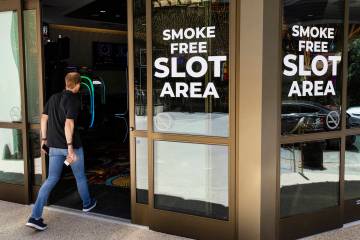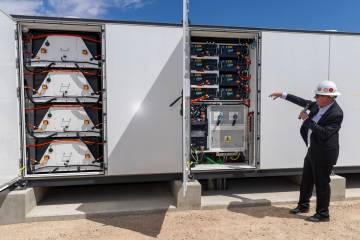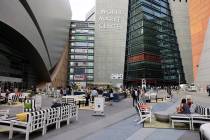Commercial market tilts to tenants
No matter how bad the economy gets, nobody wants a dirty, smelly dog.
That's why Kathy Patterson decided to open Barking Dogs Self-Wash and Grooming at Cimarron and Blue Diamond roads in the southwestern Las Vegas Valley.
While many retailers are struggling to make payroll and expenses, Patterson saw an opportunity to expand her business. She also owns Barking Dogs Bakery and Boutique on Rainbow Boulevard.
The new Barking Dogs self-wash offers HydroSurge bathing tubs, nail trimmer and shedding tool rentals, absorbent towels and add-on colognes. Best of all, the staff cleans up the mess.
Patterson is among only a few business owners willing to invest in today's market.
It's not a bad risk for entrepreneurs who have always wanted to start their own businesses, but couldn't afford the rent, said Kit Graski, retail broker for Voit Commercial in Las Vegas. Now they can pay $2,000 a month instead of $3,000 to $4,000 for the same space.
He said Las Vegas has absolutely switched from a landlord's market to a tenant's market.
A year and a half ago, rental rates were increasing and there was generally a "big bucket" of tenants chasing retail sites, Graski said. That pressure held rents up. Now a few tenants can choose from many sites, giving them the upper hand in lease negotiations.
"There's not the demand there once was," he said. "The national big-box tenants ... most have put their plans on hold. There's still a few moving around, taking second-generation space, but for new shopping centers and new space, most everybody put their plans on hold for the foreseeable future."
Commercial real estate has taken a beating along with the housing market. Commercial mortgage delinquency rates have doubled in a year, vacancy has surged and foreclosures are looming.
Southern Nevada's commercial development will be severely affected by foreclosures, real estate analyst John Restrepo of Restrepo Consulting Group said. The wave of commercial real estate defaults is gaining strength each month and will likely crest sometime in 2010, he said.
Troubled commercial real estate assets in Las Vegas jumped 72 percent from $4.7 billion in early 2008 to $8.1 billion in April, according to New York-based Real Capital Analytics. About one-fourth of commercial projects are in financial trouble, with apartment complexes experiencing the most difficulty.
Access to financing and economic uncertainty are cited as the biggest obstacles to recovery in commercial real estate, a May survey by Los Angeles-based LoopNet showed.
Forty-two percent of respondents do not expect commercial real estate sales transaction activity to pick up until 2010, while 26 percent do not expect recovery until 2011. One-third believe the market will start to improve this year.
"Our market benefited from a bigger upswing in the good times," said Todd Manning, retail broker for Marcus & Millichap in Las Vegas. "We're consequently suffering a bigger downswing and it's going to take us a little longer to recover."
Retailers are cutting inventories, cutting payrolls and cutting prices to survive, he said.
Some are negotiating lower rents with varying degrees of success. Fast-food restaurants are introducing "dollar menus" and lower-priced items to meet tight consumer budgets. Retailers that offer discounted products and services are definitely doing the best business in this economy, Manning said.
Nearly half (46 percent) of respondents to the LoopNet survey see access to capital as the most significant obstacle to recovery. Economic uncertainty, which in turn significantly influences asset pricing, was the second-most-cited obstacle at 29 percent.
"We can expect a very constrained credit and lending environment for some time," Restrepo said.
Nearly one-fourth of respondents explicitly cited differences in pricing expectations between buyers and sellers as the most important obstacle to recovery. Although results were largely consistent across all three major participant segments, owners rate the importance of access to capital slightly higher and differing price expectations slightly lower than brokers or investors.
More than 1,500 commercial real estate investors, brokers and owners who use LoopNet's online service responded to the poll, which was conducted May 7-21.
"The important thing people should know is that deals are getting done and tenants are leasing space," Las Vegas office and industrial developer Jeff LaPour said.
He recently completed a seven-year lease of 23,000 square feet for KGA Architecture at LaPour Corporate Center near the Beltway and Flamingo Road.
"There's activity and I think tenants are starting to recognize the opportunity they have to get value," he said. "There's more options for tenants to look at. It slows absorption and makes it a more competitive environment."
Rod Martin, vice president of Majestic Realty, said he signed deals with Staples for 37,500 square feet of warehouse space and 5,600 square feet of office space in February and with Portfolio Recovery Associates for 30,000 square feet of office space in November.
He said he's been successful in negotiating lease extensions with 80 percent to 90 percent of Majestic's existing tenants without dropping rental rates or reducing the size of the premises.
"For what it's worth, we could likely have done a few more industrial deals if we were willing to drop our rates more," Martin said.
Developers are on course to build 2.2 million square feet of new retail space in Las Vegas this year, down 62 percent from 5.9 million square feet in 2008, Marcus & Millichap's Manning said. That figure may be revised downward as many developments are being canceled or scaled back, he said.
New development will likely be limited until the housing market stabilizes and employment figures and absorption of existing space turn positive, Manning said.
How long will that be?
"Locally, the next year is going to continue to be very difficult for our employment and retail market," he said. "I don't think we'll see economic figures as bad as they were at the end of 2008 or the beginning of this year, but we're still in for higher commercial vacancies before things stabilize."
He expects retail vacancy to reach 12.1 percent this year, up 360 basis points from last year.
Still, retailers are showing long-term interest in Las Vegas. Manning said he's spoken with several regional restaurant chains that expressed interest in expanding here, although their location was limited to the Summerlin or Green Valley communities.
Investors are also starting to look at the market again after taking a long hiatus as prices adjusted.
"We're starting to see interest and offers on our recently listed properties," Manning said.
Contact reporter Hubble Smith at hsmith@reviewjournal.com or 702-383-0491.




























